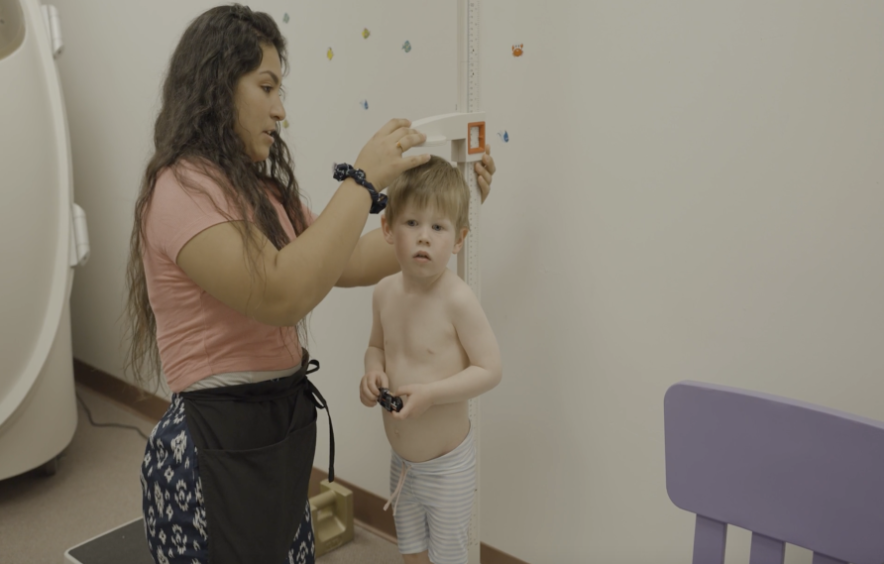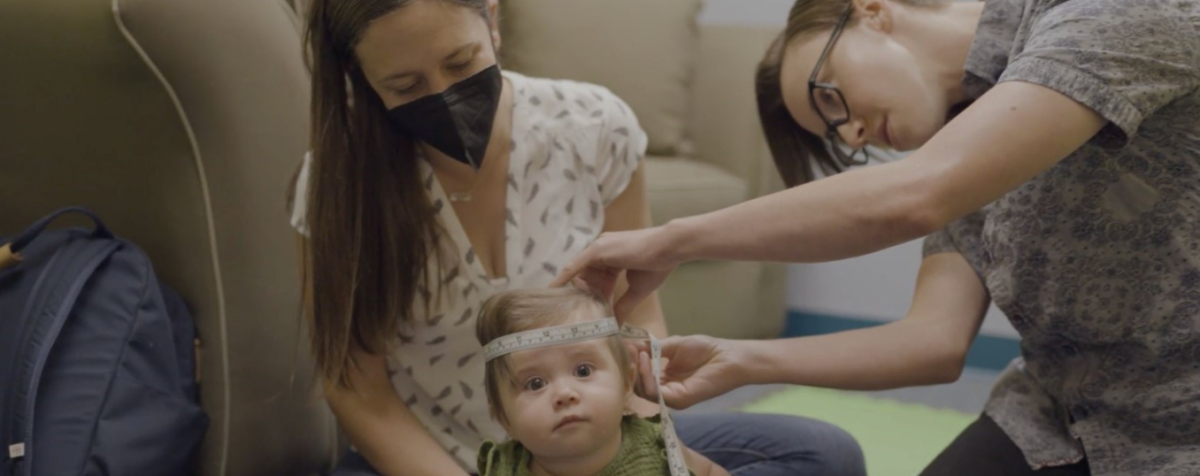Collaborative Projects & Training
At the SEED Research Institute, we're applying SEED Science to address real questions in our communities. We provide training and mentorship to postgraduate, graduate and undergraduate students who want to explore the ways early experiences continue to influence across the lifespan. Our collaborations with community members, with students and with fellow faculty make a difference in the field of developmental science and in the lives of families.
Collaborative Projects
-
Reducing Prenatal Maternal Depression to Benefit Childhood Cardiovascular Health
Jenalee Doom, PhD, and Elysia Poggi Davis, PhD
Cardiovascular disease (CVD) is the leading cause of death worldwide. The origins of adult CVD begin prenatally: High prenatal maternal depressive symptoms predict offspring CVD risk. However, there is a lack of experimental work using a randomized controlled trial design to understand potential mechanisms that contribute to children’s CVD risk following exposure to high maternal prenatal depressive symptoms. This collaborative study leverages a randomized controlled trial of an effective psychosocial intervention for prenatal maternal depression (The Care Project). This project will test whether reducing prenatal maternal depressive symptoms improves offspring cardiovascular health and health behaviors (e.g., sleep, physical activity, diet, eating behaviors) at ages 3–4 years. This multisite and collaborative project involve undergraduate and graduate students as well as faculty and staff from multiple intuitions including the University of Colorado Medical Center and Denver Health. Research is supported by the National Heart, Lung and Blood Institute (R01 HL155744).
-
Advancing Engagement and Efficacy of Interventions for Co-Morbid Sleep and Behavior Problems in Young Children
Sarah Watamura, PhD, and Julia Dmitrieva, PhD
This multi-site project is an RCT aimed at understanding how to overcome barriers to early child interventions for comorbid child sleep and behavioral problems in low-income families. The project is enrolling 500 low-income toddlers who have co-morbid sleep and behavior problems. The families will be randomized to one of four home visiting interventions: sleep, behavior, family choice (sleep or behavior), and an active control. This project will test the effects of intervention type (sleep vs. behavior) and family input (choice vs. assigned) on child symptoms and family functioning and assess which intervention families prefer, engage with and value most. Results will inform best practices for engaging low-income families in interventions to treat co-morbid sleep and behavior problems, which will be critical to reducing early health disparities for young children living in poverty.
-
Transitions to Fatherhood
Elysia Poggi Davis, PhD, and Angela Narayan, PhD
Fathers' experiences and perspectives during the perinatal period are understudied. Fathers who are expecting or recently had a baby complete a series of online questionnaires to assess their histories of adversity, cumulative stress, benevolent childhood experiences, current mental health symptoms and transition to fatherhood. So far over 100 fathers have participated in this project. This project is coordinated with graduate and undergraduate students and was funded by a grant from DU.
-
Childhood Experiences and Adult Romantic Relationships
Angela Narayan, PhD, and Galena Rhoades, PhD, in partnership with graduate students Laura River, Maggie O'Reilly-Treter and Cassie Svelnys
In partnership with graduate students, we conducted a series of systematic review papers on the legacy of parental sensitivity and parent-child attachment on dyadic romantic relationship adjustment (published in Family Process), and on the effects of childhood maltreatment on romantic relationship adjustment (currently underway). This ongoing work comprehensively summarizes the extant literature on early relationships and adversity as they affect how both partners within a couple interact, resolve conflict, and support one another
-
Intergenerational Transmission of Early Adversity
Angela Narayan, PhD, and Elysia Poggi Davis, PhD
The perinatal period is an opportune window to deter the intergenerational transmission of risk and adversity and promote resilience in mothers and infants. This collaboration has resulted in a recent review paper that was just published in Development and Psychopathology, and a systematic review paper that was also authored by DU clinical child psychology graduate students, and published in Child Abuse & Neglect.
-
Examining the Biological Embedding of Resilience in Immigrant Parents and their Adolescent Children
Pilyoung Kim, PhD and Sarah Watamura, PhD
This research will focus on adolescent and immigrant parents. Working from intensive data already collected and in progress from a larger sample of young adult parents, we invite the parents to participate in an fMRI follow-up assessment to study their brain activations that are involved in parenting and emotion regulation. We hope outcomes of the finding help to improve understanding of the challenges and resilience factors among the parents (see the Childhood Health and Development Lab website). This research is supported by the Ford Foundation.
-
Adverse and Benevolent Childhood Experiences Predict Psychosocial Functioning During the COVID-19 Pandemic
Jenalee Doom, PhD, Angela Narayan, PhD, Kathryn Fox, PhD
Adverse childhood experiences, such as abuse, neglect and witnessing domestic violence, are associated with poorer psychosocial outcomes in adulthood. Benevolent childhood experiences, which include having a stable caregiver or a caring teacher or friend, are associated with better adult psychosocial outcomes. Our work is currently investigating whether adverse and benevolent childhood experiences predict psychosocial functioning in adults during the COVID-19 pandemic above and beyond levels of current stress and social support. Our findings suggest that benevolent childhood experiences predict outcomes such as lower depressive symptoms, perceived stress and loneliness, while adverse childhood experiences only predict higher depressive symptoms.
-
Inflammatory Trajectories Across Pregnancy as Predictors of Postpartum Depression
Erika Manczak, PhD and Elysia Poggi Davis, PhD
Pregnancy is a time of substantial biological change, including for a mother’s immune system. In fact, during pregnancy, the immune system needs to learn to not attack fetal cells while also protecting both mother and fetus from external pathogens. However, it is possible that some of these immunological shifts actually increase risk for depression. In this multi-site collaboration we are using data from the Care Project to first chart changes in important immune markers in women’s blood during each trimester. From this, we are then testing whether women who eventually develop postpartum depression show earlier-emerging differences in immune marker trajectories. Findings from this study will not only help establish normative levels of important immune markers across pregnancy but also hold the potential to identify new biological pathways implicated in postpartum depression and to establish biomarkers of elevated risk. This research is in partnership with researchers and clinicians from Denver Health and the University of Colorado as well as graduate and undergraduate researchers at DU. Research is supported by the National Institute of Mental Health (R21 MH124026).
-
Working Together: The Impact of Denver’s Multidisciplinary Response Team (MDT) on Caregiver Engagement and Child Outcomes Following Child Abuse and Neglect
Julia Dmitrieva, PhD and Anne DePrince, PhD
Following child abuse or neglect reports to law enforcement, children and their families can become involved in investigations that span multiple government systems including child welfare, criminal justice and health agencies. Little research is available on the efficacy of multidisciplinary teams (MDTs) as a strategy to increase caregiver engagement, reduce out-of-home placements, and improve child and family outcomes. Partnering with government agencies, this project brings together faculty and graduate student researchers to examine the impact of an MDT response using administrative data and caregiver interviews. This research is supported by the Colorado Evaluation and Action Lab.
-
Intimate Partner Abuse and Traumatic Brain Injury
Anne DePrince, PhD and Julia Dmitrieva, PhD
Women experiencing intimate partner abuse (IPA) may be exposed to frequent and/or severe traumatic brain injuries (TBIs) that affect emotional, cognitive and behavioral outcomes as well as health service needs and use. This research fills a gap at the intersection of IPA and TBI to address three key questions: Which characteristics of TBI and/or IPA history (recency, frequency, severity, onset) predict health needs and service use three months later? What emotional, cognitive, and/or behavioral factors link TBI and/or IPA with later service use? The research team brings together faculty, graduate student and undergraduate student collaborators in partnership with the Rose Andom Center. This research is supported by the State of Colorado, MINDSOURCE Brain Injury Network.

Training
The SEED Research Center is dedicated to training students interested in understanding the influence of early experiences on health and development across the lifespan. Training opportunities at the SEED Research Center are available for postdoctoral scholars, graduate students and undergraduates. The SEED Research Center provides a unique opportunity for students to participate in cutting-edge research in the field of developmental science.
Our collaborative and interdisciplinary research environment supports training with diverse tools and populations. Students use a range of methodologies including structural and functional MRI, eye-tracking, psychophysiological markers of stress and health (hormones, antibodies), genotyping, cognitive testing, and video recording and analysis to answer questions about developmental processes in typical and disadvantaged environments.
Our interdisciplinary focus includes an emphasis in developmental cognitive neuroscience and developmental psychopathology. Ongoing collaborations with scientists at the University of Colorado Health Sciences Center, National Jewish Medical and Research Center, and the Institute for Behavioral Genetics at the University of Colorado Boulder provide unique collaborative opportunities for students.
-
Postdoctoral Scholars
The SEED Research Center faculty offers opportunities for postdoctoral training. For more information, please contact Professor Elysia Poggi Davis at elysia.davis@du.edu or Professor Sarah Watamura at sarah.watamura@du.edu.
-
Graduate Students
The SEED faculty accepts graduate student applications each year. If you have questions about admission criteria, please visit the Department of Psychology website for more information. If you have questions about the application process, please contact Paula Houghtaling, the administrative staff person who oversees admissions, at phoughta@du.edu. For more information about mentoring by SEED faculty, please email the relevant faculty member(s) directly.
-
Undergraduate Students
We are looking for students (from all fields) seeking a unique research experience for course credit or work-study. Students must be willing to make a minimum one year commitment at six to nine hours per week.
Student Research
Deborah Han, PhD Student and 2024 SEED Paper Award Winner

This review paper synthesizes the empirical evidence for positive childhood experiences (PCEs) as resilience factors for adult outcomes. Specifically, we assess the evidence base for PCEs as counterparts to childhood adversity and clarify the resilience processes (promotive versus protective) by which PCEs contribute to more adaptive outcomes. This paper highlights gaps in current literature, provides directions for future research, and discusses implications for prevention and intervention efforts.
Melissa Nevarez-Brewster, PhD Student and 2025 SEED Paper Award Winner

Sleep During Pregnancy and Offspring Outcomes From Infancy to Childhood: A Systematic Review
Prenatal maternal sleep problems are linked to poor birth outcomes. However, much less is known about the associations between poor prenatal maternal sleep and offspring outcomes after birth. We systematically reviewed 34 empirical studies and found that poor prenatal sleep is also associated with poorer offspring sleep, higher body mass index, higher prevalence of physical health conditions, poorer global development, more behavioral problems, and differences in offspring brain structure and function.
SEED Research Grant
Awarded to Sydney Ye and Katherine Czech
Environmental Racism and Mental Health: A study of disparate environmental exposures and mental health outcomes in the Denver, CO Metro Area



